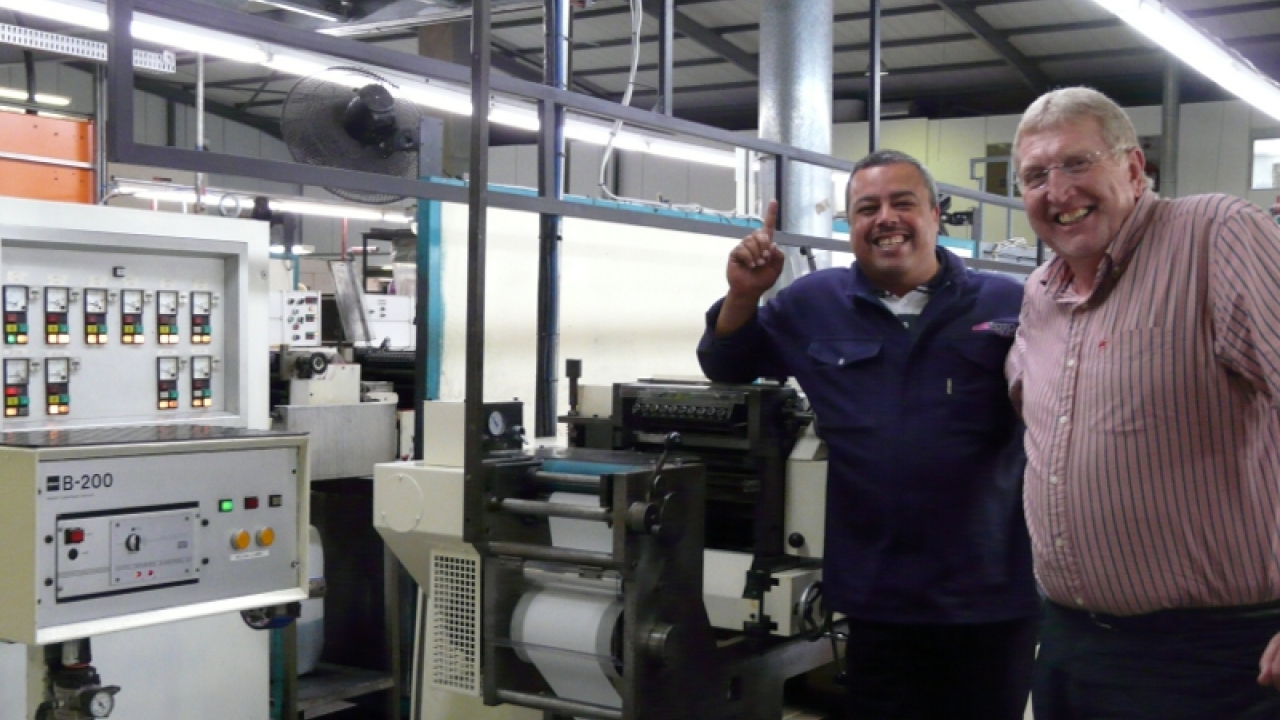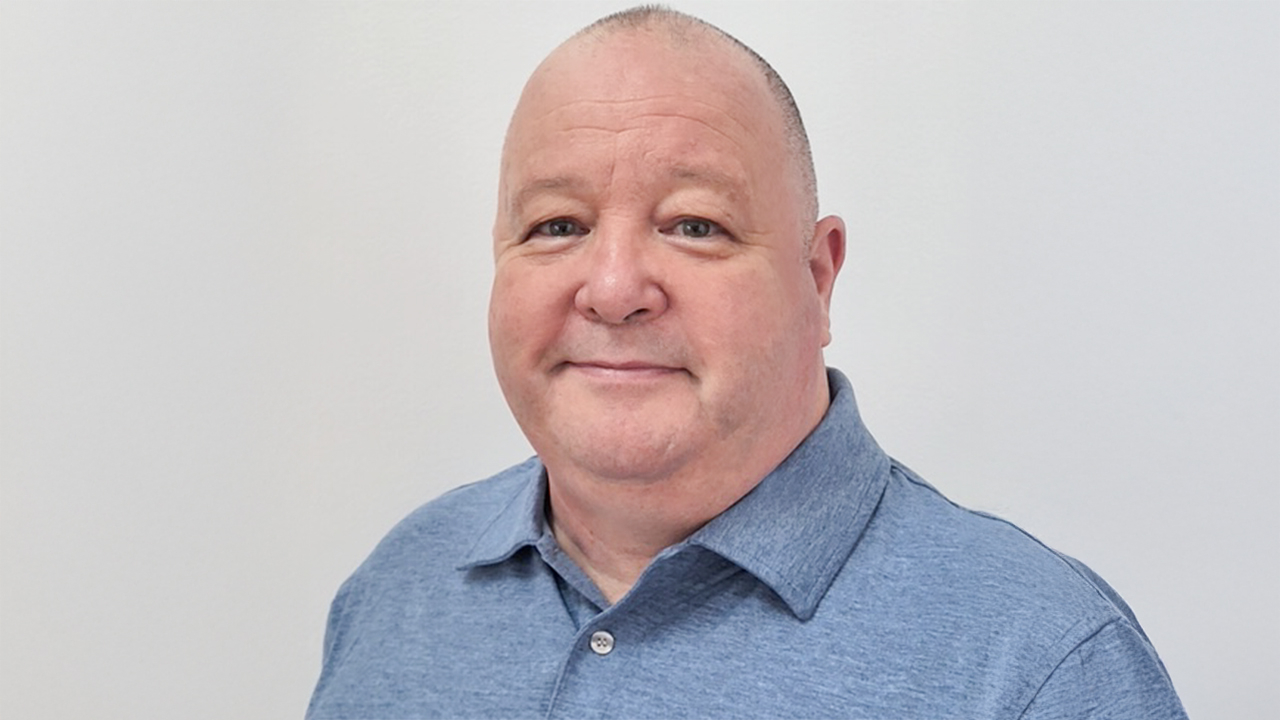South Africa Focus: Converter Guide

South Africa is home to a world class label converting community. Danielle Jerschefske visited a selection of leading companies
Track & Trace
Founded in 1995 by Lee Barnard and Theresa Adinolfi, Track & Trace recently partnered with a private equity firm to increase the business’ cash flow and ability to invest. Starting as a PS label distributor, in 2009 the company purchased an 8-color 14” Gidue press to advance into prime label production. Now management is looking to exchange the press for something wider which can handle both pressure-sensitive film and unsupported film, including cutting to sheets, and which is able to reverse print behind the film. Track & Trace uses a Mark Andy Scout with 4-color inkjet heads for variable data printing on computer labels.
Rebsons
Rebsons started in the early 1960s making small tags for the jewelry market on a Melzer Machine. When PS label demand spread, the company switched to a small two-color machine, eventually acquiring the funds for a new 4-color press to truly expand into PS labeling. Rebsons now has 70 employees running production 24/7 for private label FMCG, dealing direct with retailers. Its most recent investment is a Nilpeter FB 3300 servo press.
Label & Litho
Louis Smit purchased a small litho printing company with a partner in 1982 while his brother, Sakkie Smit acquired a label company on auction in 1990. The two brothers merged their respective companies and formed Label & Litho in 1995. The business is located in Pretoria, where the label division concentrates on ticket production for game redemption, parking, bus passes and more. It prints millions of reward tickets for childrens’ indoor play parks using a 6-color MA 2200 and an MA 830 equipped with a Jaime 1000 S4 plus inkjet system for variable data. Converting the foil for the mag strip on cards is a specialty carried out using a Nilpeter press. The company has 50 employees.
HP Labelling
With locations in Cape Town and Johannesburg, HP Labelling produces work mostly for local brands in the water, juice and beverage markets, pharmaceuticals and fruit labels. Around 20 percent of business is in wine and spirits. Neville Gibbs, divisional director of HP Labelling Cape Town, explains, ‘This broad market view gives the business a shield from the up and down of the economy.’ Volumes increased during the World Cup when production moved into three shifts, but has since pulled back to two. Gibbs estimates the Cape Town location, with 110 employees, has over 5,000 solid dies for one dual gear Mark Andy LP 3250 press and a fleet of ten 2200 gear presses.
GTV
GTV was established in August of 1989 by Ravi Pillay, following in the footsteps of his father, who started in the SA label industry in the 1970s. The company has advanced from humble beginnings, as Pillay explains: ‘We used the off-cut rolls of a nearby converter to produce production work. With the price of raw materials, this was the only way to break into the market and have a reasonable profit margin.’
Pillay got the cash for a down payment on GTV’s first press by winning a whopping 80,000 Rand playing a 40 Rand slot machine. The company now has an 8-color Nilpeter FA-4, running mostly solvent-based inks. The converter has designed its own lamination device for the press, which is not designed to run solvent-based inks. While running at 120m/min, the unit builds up the heat on the web prior to applying the lamination.
The lamination of solvent ink is an extremely difficult trick, widely done in the wide web market, but increasingly adopted in the narrow web sector. The press is equipped to run all UV, but GTV usually does not, to save on the more costly inks. The company’s press is 8-color flexo with six UV units.
The majority of GTV’s work is PS, as well as paper and wrapper films for small packages of candy bars and such. It is heavily involved in the oil market, producing Total Oil labels with reversed out four-color process on a home-built 6-color machine. The converter recently purchased a Nilpeter FB 4200 to increase capacity, reduce lead times and move into the film market.
Ferroprint
Ferroprint is reckoned to be SA’s largest label converter by volume. Based in Durban, it employs 220 people and runs seven days a week with sales offices around the country. The bulk of its business is in FMCG, H&B, beverage and pharmaceuticals; it sold its wine label company to CCL in 2009. The converter has been in the shrink sleeve label market for 18 months, finding good growth there.
An interesting facet of Ferroprint’s business is an automated clothing tag production system designed by Jeremy Ferrow, MD, using digital Nipsons and self designed, unwind, die cutting and sheeting machines. Garment retailers send their variable data files via logistics and marketing company Trader Plus, that sorts and forwards the data to the company. The tags are printed directly without requiring an additional PS label, all without human intervention. The exact system has been replicated in Ferroprint’s $3.5m Chinese facility opened in late 2008.
Ferroprint has invested in a number of automation and communication tools to drive profitability, focusing on the power of visual communication to match the current education level of the majority of the country’s workforce.
The company’s homemade MIS system is incredible. Everyone in the company has access to live data, both in-house and remotely. Material handling is seamless. When sales enters an order into the database, the PO is sent automatically to Avery Dennison with a unique code for details such as slit size and quantity.
All stock is regularly separated into two areas: work in progress, and raw stock. Jeremy Ferrow explains, ‘In separating material by each 12 hour shift we provide a visual means for establishing work completed and work to be done, by job order.’
Ferroprint uses a mix of Nilpeter FA 3300, FA 4 and FA 6 machines to produce mostly PS labels. Each press is equipped with a computer system that gives multiple screen prompts for the operator to monitor their own productivity. Operators select a reason for press downtime through computer prompts such as: customer approval, ink error, die, UV curing, pre make-ready and lunch. Once an operator selects an error button, the problem is automatically flagged in maintenance and the time is allocated to that part of the production team. The computer calculates and carries an operator’s ‘debts’ as lost time and sets individual targets for improvement.
Ferrow explains, ‘This system speeds up accurate resolution of problems, which improves productivity.’ There is even a referee on the floor to handle disputes.
Two large screens hang on the wall of the shop floor which all can see. Screen one shows the production graph of a 24 hour shift – work completed and to be done. Screen two shows a bar chart for each press, making it easy for a production manager to visually assess the progress of any job on any press, and move quickly to address problems before an ‘error’ call.
Both screens are updated minute by minute. Operators see the productivity bar for their own press on their computer. The bar accounts for make ready, production and clean up time for any given job.
Jabula – Zulu for ‘happy’ – interacts with associates at the bottom of the job-by-job production screen. When an operator is on time, Jabula is happy, but if an operator is running late, Jabula gets angry and spits fire.
‘Debts’ for each department and shift are tabulated daily to show Debt per Shift and Debt per Operator. Ferroprint has an incentive system based on a ten point scale to reward productivity. Rewards are given shift by shift, creating healthy competition. Overall, the MIS system showed a 25 percent productivity increase after working for one year.
Uniprint
Uniprint started as a family-owned business in Durban in 1926. It has four divisions: offset sheets and PoP, wet-glue, cartons and pharma boxes; silk screen; forms and labels; catalogs and brochures. It is a qualified PS label supplier for Unilever, Reckitt Benckiser and more and supplies high-volume wrap and shrink sleeve labels to the beverage market, including Coca-Cola and Pepsi. It also manufactures ‘butterfly’, or two-ply peel & read labels for pharmaceuticals and produces flexible packaging.
Uniprint uses a 560mm Comco to convert unsupported films for the beverage industry and is investigating IML for the dairy and industrial segments. It uses an HP Indigo ws4500 for runs up to 1,000m. Two Mark Andy full UV flexo machines handle short to mid-sized runs, and medium runs go onto three Nilpeter MO offset or FA 3000 flexo presses. Forms and brochures are printed on a Heidelberg Speedmaster. A Nipson meets the converter’s variable image requirements and track & trace barcode needs.
Uniprint has a niche in security work for national elections, printing voter registration forms for many African countries. Combined with a sophisticated software package to print ballot forms, Uniprint’s system helps ensure a credible, legitimate election.
Significantly, in 2008 Uniprint joined forces with Hirt & Carter, one of the country’s foremost software providers linking advertising agencies and marketers to printers, and working closely with the nation’s largest retailers. Bharat Mehta says, ‘the merger brought an integrated IT solution to pull artwork automatically from clients to create product packaging, advertisements etc, and it captures ad data on price point in local, regional and national retailers.’
As of November 1 2010, Uniprint is part of publicly held South African media conglomerate Avusa. Avusa has business interests in many areas, including cinemas, newspapers, magazines, and book retailing. Mehta says, ‘We intend to find growth in packaging and how it fits into the overall business plan of Avusa.’ This could help the converting side of the business penetrate the private brand market.
First Impression Labels
A leading FMCG converter, Durban-based First Impression Labels is a 14 year-old business started by Sandra Cumming and Vaughn Cumming, in a barn with a Flexo Diecutter. Richard Jones, Sandra’s brother, worked with the company for some time before moving out to start his own label company.
First Impression recently installed a new Mark Andy Performance Series press – a 9-color, 430mm P-7 model. The converter needed capacity, particularly for shrink sleeve label production, beyond what its XP5000 and battery of MA2200s could produce.
First Impression entered the sleeve market in 2007, and for the last six years has experienced strong year-on-year growth. Sandra Cumming, MD, says, ‘wrap around and shrink are cut-throat markets in South Africa and shrink was a difficult market to break into.’ But Cumming sees opportunity for growth in both PS and shrink. ‘25 percent more brands are choosing shrink for packaging.’ She attributes the shift to legislation requiring more information to be on a label.
First Impression uses Karlville shrink-dedicated seamers, cutters, and inspection equipment.
The converter supplies roll-fed wrap-around and PS labels for multinational firm SC Johnson, and attracted its business for shrink sleeves with the recent investment. Cumming says, ‘if you look at the ZA market as a whole there’s lots of business to be had in the dairy and juice markets.’
The quality of the company’s shrink label work was recognized with a finalist nomination for the FTASA’s (Flexographic Technical Association South Africa) Printing Excellence Awards. The Winnie the Pooh bath and shower gel shrink sleeve labels were produced with locally supplied plates from ICS Digital and Flint Group Narrow Web inks.
Rotolabel and Lithotech Labels
Del Wiggel, who now works for Nilpeter’s agency in South Africa, founded Rotolabel with two partners and a German investor in 1981. Rotolabel now forms part of Bidvest Paperplus, a division of the Bidvest Group of companies. Today the company converts mainly PS labels, including multi-ply labels, in the retail, wine, personal care and pharmaceutical sectors for a wide range of customers from small to large corporate companies like Johnson & Johnson and Glasgow Smith & Klein, and big retailers such as Spar and high-end retail/supermarket chain Woolworth’s.
‘We need to be flexible in scheduling in order to properly support our customers,’ says Greg Gabriels, technical director at Rotolabel. Woolworth’s re-launched its brand packaging a couple of years ago to standardize their branding proposition across all lines.
Gabriels worked his way up from cleaning floors at Rotolabel to having responsibility for maintenance of the plant’s press fleet and for training operators on the letterpress machines. The plant includes nine Nilpeter letterpress machines – four 300mm wide B-3000s, of which two can do silkscreen and foiling, and five B-200s. The machines are still able to run at 250ft/min (83m/min) and to hold a one percent dot on a photopolymer plate. Production runs 24/7.
Lithotech is a sister company to Rotolabel, and MD Kevin Swan is working to integrate four different labels and forms businesses, each with a different niche from process color UV flexo to blank labels, into one operation. The plant in Johannesberg houses twenty presses in total – Gidue, Comco, Aquaflex, Gallus and Mark Andy – which presents problems in terms of tooling, materials, scheduling and maintenance.
The converter does some nice business with the national Post Office using a Digital Print Inc inkjet system attached to a 5-color press, and sees a major growth opportunity in this type of application.
Wine label awards
Every two years UPM Raflatac hosts the Wine & Spirit Labels of Excellence Awards competition, which recognizes the power of a strong partnership between label stock supplier, converter, designers and the brand owner when creating a label with serious shelf impact. Self-adhesive labels are the dominant bottle decoration technology for this market.
Rotolabel was the big winner in the 2010 excellence awards, including Best Label Overall, Innovative Artistic Merit, Outstanding Technical Achievement and the Designer Award in the wine labels category. Paarl Labels, which uses MPS and Nilpeter presses, received Special Mention; Collotype Labels, an all Nilpeter house with gravure combination, won for Outstanding Technical Achievement, and HP Labelling, an all Mark Andy press shop, won Creative Branding.
In the spirits category, Pyrotec won for Outstanding Technical Achievement and CCL Label Cape won for Creative Branding. The winning labels advance to the Institute of Packaging (SA) to be judged for its Gold Pack Awards.
This article was published in L&L issue 2, 2011
Pictured: Greg Gabriels and Del Wiggel in front of thirty year-old Nilpeter letterpress in Rotolabel
Stay up to date
Subscribe to the free Label News newsletter and receive the latest content every week. We'll never share your email address.


